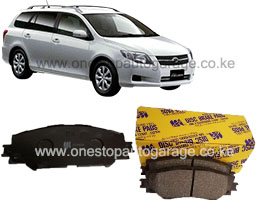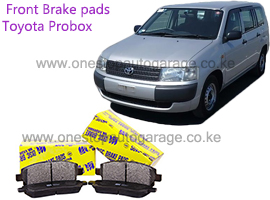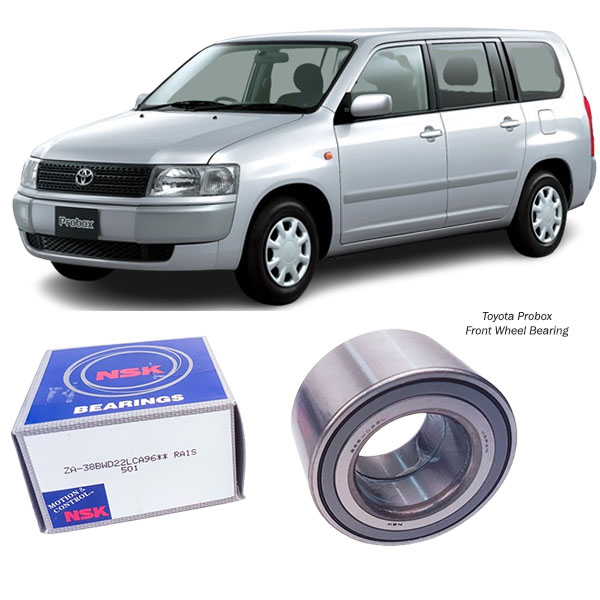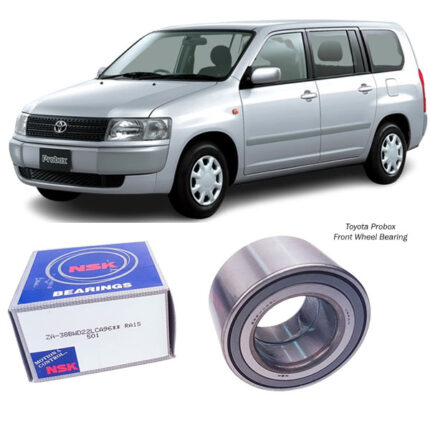Get Toyota Probox Front Wheel Bearing Without Magnet 38BWD22LCA96 in Kenya
The Front Wheel Bearing Without Magnet is a crucial component in a vehicle’s wheel assembly, enabling smooth and friction-free rotation of the wheel. Unlike wheel bearings with magnetic encoders, which are used in ABS (Anti-lock Braking System) and traction control systems, a non-magnetic wheel bearing is a standard bearing without a built-in speed sensor. It is commonly found in older vehicles or models without ABS functionality.
A well-maintained front wheel bearing ensures:
✔️ Smooth wheel rotation
✔️ Stable handling and steering control
✔️ Reduced rolling resistance for better fuel efficiency
✔️ Long-lasting wheel hub and axle components
This guide provides a detailed explanation of front wheel bearings without magnets, including function, components, working mechanism, failure symptoms, replacement procedure, and maintenance tips.
1️⃣ What is a Front Wheel Bearing Without Magnet?
A front wheel bearing is a precision-engineered mechanical component that allows the wheel to rotate smoothly with minimal friction. It is located within the wheel hub assembly and is responsible for supporting the weight of the vehicle while ensuring free movement of the wheel.
Difference Between Magnetic & Non-Magnetic Wheel Bearings
| Feature | Magnetic Wheel Bearing | Non-Magnetic Wheel Bearing |
|---|---|---|
| ABS Sensor | Contains magnetic encoder for ABS | No built-in magnet |
| Application | Found in modern vehicles with ABS/traction control | Used in vehicles without ABS |
| Speed Sensor Compatibility | Works with electronic wheel speed sensors | No interaction with ABS sensors |
| Failure Symptoms | ABS warning light, braking issues | Noise, wheel play, steering issues |
A non-magnetic wheel bearing functions like a traditional ball or roller bearing, providing smooth wheel rotation without the need for a magnetic encoder.
2️⃣ Components of a Front Wheel Bearing Without Magnet
A front wheel bearing assembly consists of several key components that work together to support the vehicle’s weight and provide smooth rotation.
Main Components:
🔹 Inner Race (Inner Ring) – The inner metal ring that sits on the axle shaft and rotates with the wheel.
🔹 Outer Race (Outer Ring) – The stationary outer ring that holds the bearing in place within the hub assembly.
🔹 Bearing Rollers (Balls or Tapered Rollers) – Precision steel balls or tapered rollers that allow smooth wheel rotation.
🔹 Cage/Retainer – A metal or plastic separator that keeps the balls/rollers evenly spaced.
🔹 Seals & Grease – Protects the bearing from dirt, moisture, and contaminants while ensuring proper lubrication.
These components work together to provide low-friction wheel movement while supporting heavy vehicle loads.
3️⃣ How Does a Front Wheel Bearing Work?
The wheel bearing enables the front wheels to rotate smoothly while carrying the weight of the vehicle.
Step-by-Step Working Mechanism:
1️⃣ Power from the Engine – The engine’s power is transferred to the wheels through the axle and CV joints.
2️⃣ Wheel Bearing Supports Rotation – The bearing’s inner ring rotates with the wheel, while the outer ring remains stationary.
3️⃣ Friction Reduction – The balls or rollers inside the bearing roll smoothly, reducing friction and allowing efficient movement.
4️⃣ Load Distribution – The bearing absorbs radial and axial forces, ensuring the vehicle remains stable and responsive.
5️⃣ Seals Prevent Contaminants – The protective seals keep out dirt, water, and debris, preventing premature wear.
A well-maintained wheel bearing ensures a smooth, quiet, and efficient ride with minimal friction.
4️⃣ Signs of a Worn or Failing Front Wheel Bearing 🚨
Over time, wheel bearings wear out due to constant use, high loads, and harsh driving conditions. Here are some common symptoms of a failing front wheel bearing:
❌ Grinding or Growling Noise – A worn-out bearing produces a grinding, humming, or roaring noise that increases with speed.
❌ Wheel Play or Loose Steering – Excessive bearing wear can cause the wheel to feel loose or wobbly.
❌ Uneven Tire Wear – A bad bearing can cause irregular tire wear, leading to poor alignment and handling.
❌ Vibrations While Driving – A damaged bearing may cause steering wheel vibrations or shaking.
❌ Pulling to One Side – If one wheel bearing is worn, the vehicle may pull slightly to one side while driving.
❌ Excessive Heat from Wheel Hub – A failing bearing produces excess friction, causing the wheel hub to overheat.
Ignoring these warning signs can lead to wheel lock-up, loss of control, and costly repairs.
5️⃣ Causes of Front Wheel Bearing Failure
Several factors contribute to the premature wear and failure of front wheel bearings:
🔹 Normal Wear & Tear – Bearings naturally degrade over time due to continuous rotation.
🔹 Water & Dirt Contamination – Moisture and debris can damage the seals and cause corrosion.
🔹 Poor Lubrication – Insufficient or contaminated grease increases friction and wear.
🔹 Rough Driving Conditions – Potholes, off-road driving, and rough terrain put extra stress on the bearings.
🔹 Overloading the Vehicle – Excessive weight can accelerate bearing wear and failure.
🔹 Improper Installation – Incorrect bearing installation can lead to misalignment, overheating, and premature failure.
To extend the lifespan of wheel bearings, proper maintenance and careful driving are essential.
6️⃣ How to Replace a Front Wheel Bearing Without Magnet? 🛠️
Replacing a front wheel bearing requires mechanical knowledge and proper tools.
Tools Required 🛠️
✔️ Jack & Jack Stands
✔️ Lug Wrench
✔️ Socket & Wrench Set
✔️ Torque Wrench
✔️ Bearing Puller
✔️ Hammer & Chisel
✔️ Bearing Grease
Step-by-Step Replacement Guide:
1️⃣ Lift the Vehicle – Secure the car on jack stands and remove the wheel.
2️⃣ Remove the Brake Caliper & Rotor – Unbolt the brake caliper and brake rotor to access the wheel hub.
3️⃣ Detach the Hub Assembly – Remove the bolts holding the hub and wheel bearing assembly.
4️⃣ Press Out the Old Bearing – Use a bearing puller or hydraulic press to remove the old bearing.
5️⃣ Install the New Bearing – Press the new bearing into the hub using a bearing press.
6️⃣ Reassemble the Components – Reinstall the hub assembly, brake components, and wheel.
7️⃣ Torque the Bolts Properly – Ensure all fasteners are tightened to the correct manufacturer specifications.
8️⃣ Test Drive the Vehicle – Check for smooth wheel rotation, no noise, and proper handling.
Proper installation ensures long-lasting performance and safety.
7️⃣ Maintenance Tips for Front Wheel Bearings 🔧
✔️ Check for Noise or Play in the Wheel – Inspect wheel bearings during routine tire rotations or brake service.
✔️ Keep Bearings Properly Lubricated – Use high-quality grease to prevent premature wear.
✔️ Avoid Driving Through Deep Water or Mud – Prevents contaminants from entering the bearing seals.
✔️ Drive Smoothly Over Bumps & Potholes – Reduces unnecessary shock and impact on the bearings.
✔️ Replace in Pairs – If one bearing is worn out, the other may also need replacement soon.
Following these maintenance tips can extend the life of your front wheel bearings and ensure a safe, smooth ride.
Conclusion 🎯
The Front Wheel Bearing Without Magnet is a crucial component that ensures smooth, low-friction wheel rotation. Regular maintenance and timely replacement prevent steering issues, wheel noise, and potential accidents.
📌 Key Takeaways:
✔️ Supports vehicle weight & smooth rotation
✔️ Worn bearings cause noise, vibration & uneven tire wear
✔️ Regular inspections and lubrication extend lifespan
✔️ Proper installation is key to long-term performance
Keeping your front wheel bearings in top condition ensures a safe and efficient driving experience! 🚗🔧
Follow us on Facebook for more parts.




